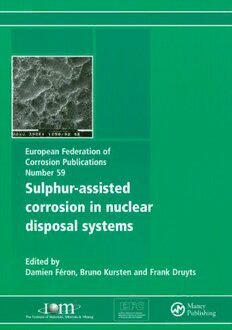
Sulphur-Assisted Corrosion in Nuclear Disposal Systems (EUROPEAN FEDERATION OF CORROSION SERIES) PDF
192 Pages·2011·4.422 MB·English
Most books are stored in the elastic cloud where traffic is expensive. For this reason, we have a limit on daily download.
Preview Sulphur-Assisted Corrosion in Nuclear Disposal Systems (EUROPEAN FEDERATION OF CORROSION SERIES)
Description:
In the different disposal concepts for high-level nuclear waste, corrosion of the metallic barriers and in particular the overpack/container is a major issue. It is imperative for performance assessment to predict the lifetime of these containers. In the lifetime prediction of metallic barriers for the disposal of high level nuclear waste (HLW) or of spent fuel, the presence of (reduced) sulphur species is an issue of growing importance, as the sulphur species are involved in localised corrosion phenomena.The international workshop on Sulphur-Assisted Corrosion in Nuclear Waste Disposal Systems (SACNUC2008) aimed to provide an exchange of information on the influence of sulphur species on the corrosion of metallic barriers. This workshop was a co-organisation of the Belgian Nuclear Research Centre, SCKoCEN, and the Belgian Agency for the Management of Radioactive Waste and Enriched Fissile Materials, ONDRAF/NIRAS, under the auspices of the European Federation of Corrosion (EFC event N 311).The proceedings are divided into five chapters:Chapter 1 provides a general overview of the disposal concepts of nuclear waste and the role of corrosion. Chapter 2 explains the mechanism of sulphur-induced corrosion processes. This chapter also contains information from outside the nuclear disposal field in which sulphur is known to act as a detrimental factor (e.g. oil and gas industry). Chapter 3 addresses the role of microbial processes in sulphur-assisted corrosion. Chapter 4 covers the modelling of sulphide-assisted corrosion. Chapter 5 is devoted to a panel discussion aiming to identify open issues in the investigation of sulphur-assisted corrosion phenomena and how to incorporate these in robust lifetime prediction of metallic barriers.
See more
The list of books you might like
Most books are stored in the elastic cloud where traffic is expensive. For this reason, we have a limit on daily download.
